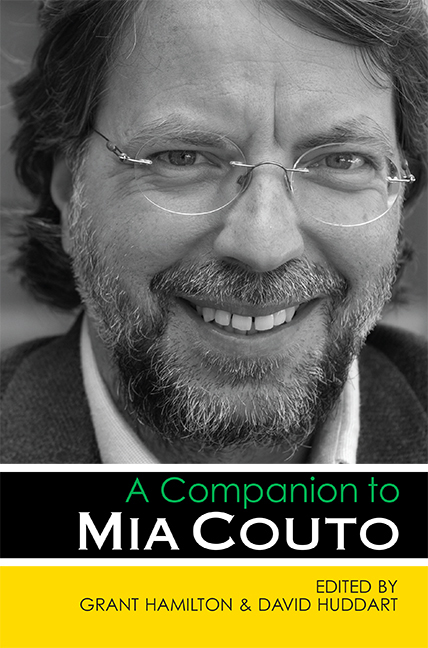Book contents
- Frontmatter
- Dedication
- Contents
- Acknowledgements
- Notes on Contributors
- Introduction
- An Interview with Mia Couto
- 1 Mia Couto in Context
- 2 Uma coisa fraterna Mia Couto & the Mutumbela Gogo Theater Group
- 3 Reading Raiz de orvalho Counterpointing Literary Genres in the Work of Mia Couto
- 4 Spaces of Magic Mia Couto’s Relational Practices
- 5 Mia Couto or the Art of Storytelling
- 6 The Multiple Worlds of Mia Couto
- 7 ‘Ask Life’ Animism & the Metaphysical Detective
- 8 Mia Couto & Translation
- 9 Jesusalém Empty Fathers & Women’s Texts
- 10 Trauma Repetition & Pure Repetition in The Tuner of Silences
- 11 Seeing Like a Crocodile Bird Mia Couto’s The Last Flight of the Flamingo
- 12 Mia Couto & Nostalgia Reading The Last Flight of the Flamingo
- 13 Mia Couto, Contexts & Issues A Bibliographic Essay
- Bibliography
- Index
13 - Mia Couto, Contexts & Issues A Bibliographic Essay
Published online by Cambridge University Press: 22 May 2021
- Frontmatter
- Dedication
- Contents
- Acknowledgements
- Notes on Contributors
- Introduction
- An Interview with Mia Couto
- 1 Mia Couto in Context
- 2 Uma coisa fraterna Mia Couto & the Mutumbela Gogo Theater Group
- 3 Reading Raiz de orvalho Counterpointing Literary Genres in the Work of Mia Couto
- 4 Spaces of Magic Mia Couto’s Relational Practices
- 5 Mia Couto or the Art of Storytelling
- 6 The Multiple Worlds of Mia Couto
- 7 ‘Ask Life’ Animism & the Metaphysical Detective
- 8 Mia Couto & Translation
- 9 Jesusalém Empty Fathers & Women’s Texts
- 10 Trauma Repetition & Pure Repetition in The Tuner of Silences
- 11 Seeing Like a Crocodile Bird Mia Couto’s The Last Flight of the Flamingo
- 12 Mia Couto & Nostalgia Reading The Last Flight of the Flamingo
- 13 Mia Couto, Contexts & Issues A Bibliographic Essay
- Bibliography
- Index
Summary
As this collection as a whole indicates, the critical response to Mia Couto's writing is already extensive. And as his works become increasingly popular to a global audience through an increasing number of translations of his work, it is clear that this range of responses will only continue to expand. For this reason, the non-Portuguese-speaking reader who is new to Couto's writing may feel a little disoriented by the wide number of critical texts available on his work, as well as the vast range of more general sources that play an important role in contextualizing the issues that commonly concern Couto. In light of this, this bibliographic essay aims to highlight the most significant works available in English with which an Anglophone reader who is new to Couto can profitably engage. It is a range of writing that concerns the various contexts in which Couto's fiction sits, and the broad issues that the reader will always come face-to-face with in his writing: translation, narrative mode, questions of identity, politics of place, and the environment. Of course, this selection of texts is not exhaustive, but as an indication of possible points of departure for continued private research and private thinking on the significance of Couto's literary oeuvre, it is felt that it is nonetheless valuable. Undoubtedly, as his reputation grows in the Anglophone world and beyond, numerous new studies will complement not only this selection of texts, but also this collection of new research that you hold in your hands.
Authorial contexts
For the reader of Mia Couto, there is no shortage of useful biographical material already available in English, even if until now much of that material has remained fairly informal in tone. Indeed, perhaps the best resources for the non-Portuguese-speaking reader are the numerous interviews that Couto has given over the years. Of these, Gendy's interview (2015), which was conducted at the time that Couto won the Neustadt Prize in 2015, is a useful point of departure. In this interview Gendy teases out a general picture of Couto's literary, intellectual, and political investments. Esposito's interview (2013) is also worthy of special mention.
- Type
- Chapter
- Information
- A Companion to Mia Couto , pp. 213 - 221Publisher: Boydell & BrewerPrint publication year: 2016



